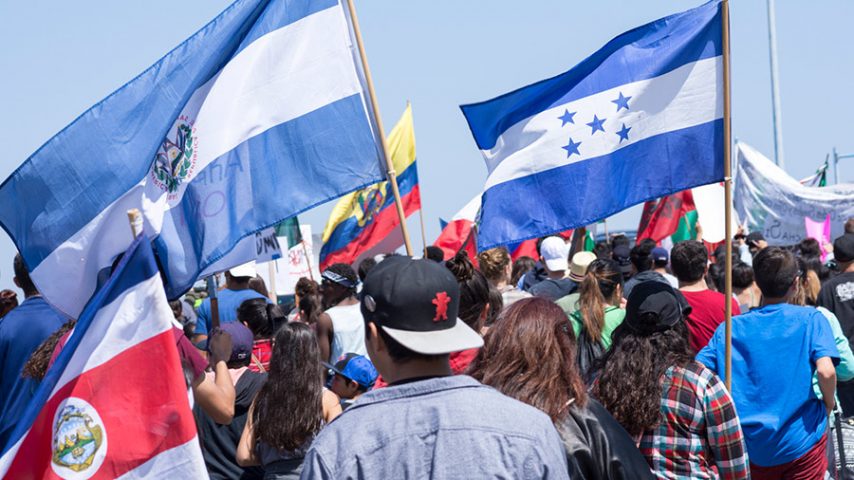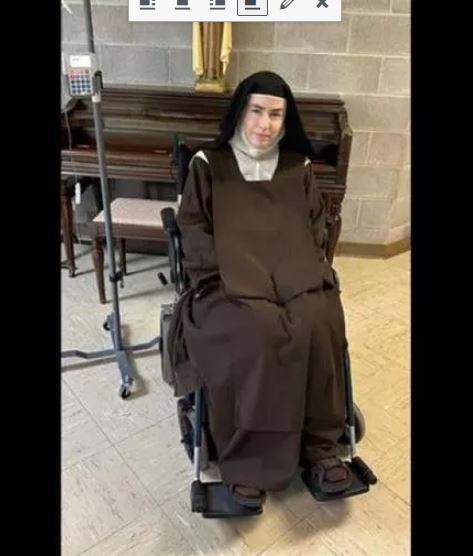John Zmirak: What Caused the Caravan? A Report from Honduras

Crisis Magazine: What Socialism Owes Christianity
November 29, 2018
Christopher Manon: Will Sex Abuse Claims Bankrupt the Vatican?
November 29, 2018
By John Zmirak, The Stream, November 29, 2018
One of the most popular Stream articles in our history was a piece by missionary Jennifer Zilly Canales, on the situation in Honduras that led to the Caravan. We decided to interview her for still more insight about the origins and likely impact of this mass movement of people.
 How long have you and your husband lived in Honduras? What brought you there? Given the conditions, how long do you plan to stay? Would you feel safe raising children there?
How long have you and your husband lived in Honduras? What brought you there? Given the conditions, how long do you plan to stay? Would you feel safe raising children there?
My husband is a native Honduran. He has lived in this country the majority of his life, with the exception of a year-and-a-half that he lived and studied in the United States. I grew up in Texas. I moved to Honduras a few weeks after completing my undergraduate degree in 2012. That was in response to a call the Lord put on my life. Namely, to be a mother to children and teenagers who have either lost their mother or for various reasons are unable to live with their her. I was single when I moved here. I had no plans for marriage. But during my first year here I met my husband. It was made clear to both of us that we were to be married and parent the orphaned/abandoned together for God’s glory.
Both my husband and I feel called to live in Honduras and hope to remain here for the rest of our lives. In these first 5+ years of marriage we have decided to not have any biological children. That’s so that we might dedicate our full energies, time and resources to raising the precious children and teens the Lord has sent us to foster and adopt. We are unsure if at some point down the road this mindset will change and we will decide to have our own biological children. But for the time being we feel completely content parenting our seven children ages 10-18. We are open to fostering/adopting more in the future. This is a beautiful calling. We would highly encourage others to consider serving the Lord and impacting the world around them in this same way by taking in youth who desperately need a family.
A Plague of Lawlessness
You described in your Stream article how the lack of the rule of law plagues Hondurans. Crimes go unpunished, even un-investigated by police. Can you expand on that, and suggest the causes, so far as you can see them?
Yes, lawlessness is rampant here. Just a couple days ago the young Christian psychologist who works alongside of us in our mission school was held up at gun-point. This happened while she was running errands and her cell-phone was stolen. The crime was committed in the parking lot of a well-known supermarket right in front of the guard on duty. He stood by throughout the occurrence. He simply asked our psychologist if she was okay once the thieves left the scene. This type of event (and the ensuing apathy/ unresponsiveness) is extremely common. It only breeds distrust and paranoia in the law-abiding public. I do not know the causes beyond the many rumors I have heard about police/government corruption, etc.
Money from North America
What role do foreign remittances, from Hondurans working in the U.S. (legally or illegally) play in Honduras? Some say they’re crucial to reducing poverty. But I’ve seen others claim that they disrupt the economy, destabilize the country, and drive men to abandon their families.
I can only speak from my very limited personal experience. I know that not all share my views. My husband and I know several families involved in these foreign remittances. I would say that they give differing results depending on the specific case.
If the caravan enters the U.S., more caravans will form in the future.
It is true that some men (and even women) abandon their families in order to go work in the United States and send money back to Honduras. Their motive is honorable. But this ultimately leaves the children (or spouse) without the daily presence, affection and security of the family member who left. We’ve seen many cases of this with people we know. Their mothers left the country when the children were extremely young. The children then grow up with grandparents or other extended family members. Their mom frequently sends them material gifts from afar. This does incredible damage to the youth. They come to associate gifts with parental love while still living without the daily love and guidance of that far-off adult. This is very sad to see. The results continue well into adulthood for those who were abandoned when they were young.
There are other families, however, that have an established routine. One parent goes abroad for a few months at a time to work. And sends money before returning to continue raising the children and being an involved member of Honduran society. I believe this is the better route to go, if one should, in fact, decide to leave the country legally for work.
Help us champion truth, freedom, limited government and human dignity. Support The Stream »
If the Caravan enters the U.S., what effect will that likely have on Hondurans? What have you heard people saying?
I work alongside some very well-educated Hondurans every day in the context of our rural mission school for at-risk kids. They seem to believe (as do I) that if the caravan enters the U.S., more caravans will form in the future. This seems very logical. This is why we all hope for long-term change to be brought about on Honduran soil. So that the Honduran people might prosper here rather than desiring to find stability elsewhere.
How Much Schooling Do the Caravan Migrants Have?
How well-educated are the people in the Caravan, in American terms? What kinds of jobs would they be able to do?
I only know a few people who joined the caravan. All of them have a very low educational level. However, there are doubtlessly people with high education levels as well. In our area there is much illiteracy among the adult population. One illiterate man whom we know well decided to join the caravan. There is also a young teen in our area. He has not yet finished his schooling. He left behind his pregnant girlfriend and escaped in the night without saying goodbye to his mother in order to join the caravan. From the research I’ve done, I understand that many male immigrants end up working in agriculture and construction in the United States. So I imagine that those with lower educational levels get channeled into this kind of work. Should they, in fact, cross the border.
One illiterate man whom we know well decided to join the caravan. There is also a young teen in our area. He has not yet finished his schooling. He left behind his pregnant girlfriend and escaped in the night without saying goodbye to his mother in order to join the caravan.
How do Hondurans see America? And Americans? What do you think they’re expecting to get or find when they arrive? Will it disappoint them?
This is a very delicate question. So I will try my best to answer well. American movies and television shows are extremely popular here in Honduras. Sadly, the message portrayed in many of them amounts to material prosperity. The movies show a lifestyle that many Hondurans desire (and cannot materially attain here). That sparks envy. In the World Geography class I teach along with our Bible Study I have touched on this subject several times. I try to explain to the youth under our care that the lifestyle painted in a lot of the American films is not realistic. Even for many Americans. Many youth seem genuinely surprised at this. They assume that the life that is portrayed in many music videos, on American television shows, etc, is the norm for all Americans. That it is what immigrants experience upon entering U.S. territory.
I believe that those under our care now have a more realistic view of America. We are teaching them that materialism does not ultimately bring happiness. Rather what brings contentment is an honest life dedicated to fulfilling God’s will. But at large there are many Hondurans who are not very well-informed about America. Also, many Hondurans who are living in the United States (whether legally or illegally) post on social media many of their purchases, banquets, etc. All of that sparks jealously in some of those who have stayed behind in Honduras and do not enjoy such luxuries. In short, some Hondurans have a realistic view of America (and materialism). Others do not. Likewise, some Hondurans see Americans as being mere gift-givers or rich tourists. Others see them as genuine servants, friends, co-workers, etc. It all depends on context and the people involved.
______________________
John Zmirak is a Senior Editor of The Stream, and author of the new Politically Incorrect Guide to Catholicism. He received his B.A. from Yale University in 1986, then his M.F.A. in screenwriting and fiction and his Ph.D. in English in 1996 from Louisiana State University. His focus was the English Renaissance, and the novels of Walker Percy. He taught composition at LSU and screenwriting at Tulane University, and has written screenplays for and with director Ronald Maxwell (Gods & Generals and Gettysburg). He was elected alternate delegate to the 1996 Republican Convention, representing Pat Buchanan.
He has been Press Secretary to pro-life Louisiana Governor Mike Foster, and a reporter and editor at Success magazine and Investor’s Business Daily, among other publications. His essays, poems, and other works have appeared in First Things, The Weekly Standard, The Atlanta Journal-Constitution, USA Today, FrontPage Magazine, The American Conservative, The South Carolina Review, Modern Age, The Intercollegiate Review, Commonweal, and The National Catholic Register, among other venues. He has contributed to American Conservatism: An Encyclopedia and The Encyclopedia of Catholic Social Thought. From 2000-2004 he served as Senior Editor of Faith & Family magazine and a reporter at The National Catholic Register. During 2012 he was editor of Crisis.
He is author, co-author, or editor of twelve books, including Wilhelm Ropke: Swiss Localist, Global Economist, The Grand Inquisitor (graphic novel) and The Race to Save Our Century. He was editor of the Intercollegiate Studies Institute’s guide to higher education, Choosing the Right College and Collegeguide.org, for ten years, and is also editor of Disorientation: How to Go to College Without Losing Your Mind.





